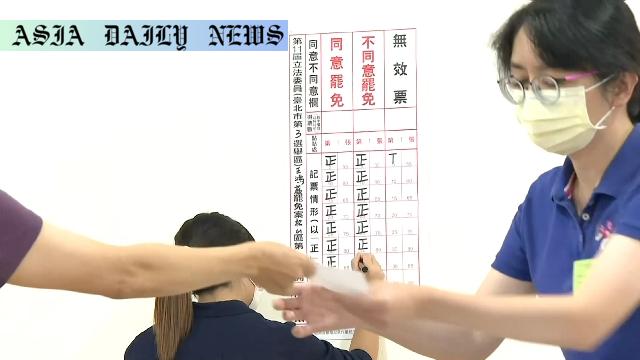Recall Election: Voters in Taiwan rejected the bid to remove 24 Kuomintang lawmakers amidst allegations of Beijing’s involvement.
- Recall Election voters rejected the removal of 24 KMT lawmakers in Taiwan.
- The election indicates support for the opposition’s parliamentary strength.
- Ruling DPP faces political hurdles due to its parliamentary minority.
- The outcome is seen as a significant challenge for President Lai Ching-te.

Failure of the Recall Election Against Kuomintang Lawmakers
In an unexpected twist of events, voters in Taiwan decisively rejected an effort to recall 24 lawmakers belonging to the opposition Kuomintang (KMT) party during elections held on Saturday. This move, orchestrated by local civic groups, attempted to strip these legislators of their parliamentary seats, accusing the KMT of fostering Beijing’s influence in Taiwan. However, the Central Election Commission announced that votes against the recall dwarfed those in favor across all respective constituencies.
The Recall Election and Its Political Implications
The KMT party currently holds 52 seats in Taiwan’s 113-member parliament, underscoring its pivotal role in shaping the nation’s legislative fabric. Meanwhile, the ruling Democratic Progressive Party (DPP) holds a slight minority, with 51 seats. This delicate balance of power renders parliamentary maneuvers increasingly challenging for President Lai Ching-te’s administration. The recall election defeat represents not just preserved stability for the opposition but also a clear indication of public approval toward opposition control in parliament.
Opposition Strategy: Budget Cuts and Defense Reduction
Critics argue that the KMT, alongside its political allies, has deliberately imposed cuts to critical areas, including defense expenditure, threatening Taiwan’s domestic and international interests. By restricting funds for defense, the opposition could be undermining the government’s strategic objectives to fortify Taiwan against external threats, particularly from China. These ongoing clashes between the DPP and the opposition further complicate political advancements within the country.
Future Prospects for Taiwan’s Democracy
Another wave of recall votes awaits seven additional KMT lawmakers on August 23. For the DPP, potential victories in by-elections could offer a pathway to reclaim parliamentary majority, provided they secure at least six seats. However, achieving this remains an uphill battle for the minority government, given the current public mood and perception of opposition effectiveness. The recent elections have showcased the electorate’s reluctance to favor immediate and dramatic legislative changes, reflecting a nuanced political landscape.
Challenges and Opportunities Ahead
As Taiwan navigates these turbulent political waters, one thing is becoming increasingly clear—voters are keenly watching both ruling and opposition parties’ efforts to manage the country’s governance. Any undue interference, whether domestic or foreign, continues to erode trust. Civic participation through recount efforts, though unsuccessful this time, highlights Taiwan’s robust democracy and commitment to holding leaders accountable. Only time will tell whether ongoing political narratives will swing momentum in favor of the ruling DPP or maintain the strength of the opposition KMT.



Commentary
Understanding the Recall Election’s Outcome
The failure of the recall election to unseat 24 Kuomintang lawmakers is a significant moment in Taiwan’s modern political landscape. It represents not only a victory for the KMT but also demonstrates the complexities and challenges of Taiwan’s democracy. The allegations of Beijing’s infiltration into Taiwan’s political framework undoubtedly added a layer of controversy to these elections, reflecting the broader geopolitical tensions in the region. Voters’ rejection of recalls indicates their trust in the current opposition influence within parliament, signaling clear approval of legislative checks and balances.
Implications for Taiwan’s Political Balance
The delicate power structure between the ruling Democratic Progressive Party and the opposition’s parliamentary majority defines the political roadmap for the foreseeable future. The DPP faces an uphill battle in overcoming these elections’ outcomes, especially with another wave of recall votes scheduled for August 23. If most recall efforts continue to fail, the opposition strength remains intact, potentially curbing the DPP’s ability to implement key reforms. This political equation could ripple across other areas, including foreign policy and cross-strait relations with China.
A Sobering Reflection on Partisan Strategies
Both the KMT and the DPP must take this opportunity to re-evaluate their strategies. The ruling party cannot solely rely on recall mechanisms to weaken its opposition and regain parliamentary majority. Instead, it should work towards addressing public concerns more effectively, ensuring that its policies resonate with the electorate. Meanwhile, the KMT must carefully navigate the tightrope of maintaining parliamentary strength without further allegations over ties to Beijing undermining its credibility. Voter sentiment in this recall election serves as a potent reminder of their commitment to preserving Taiwan’s democratic foundations.